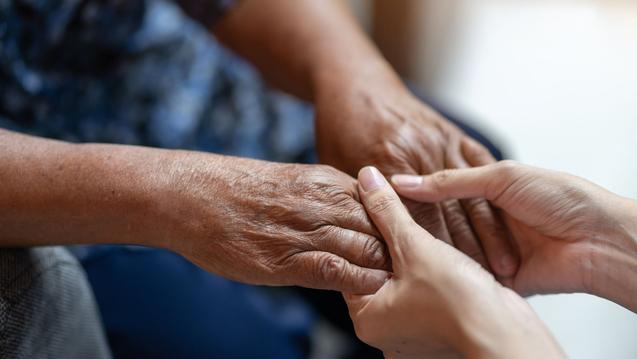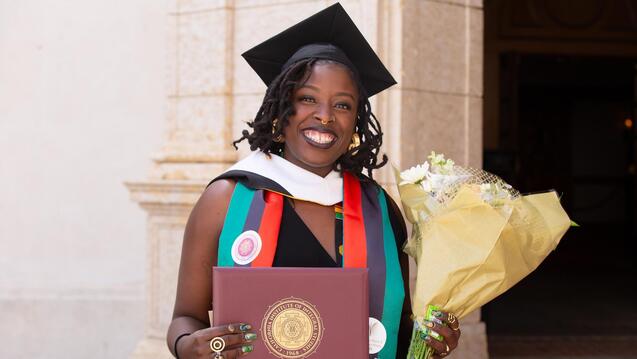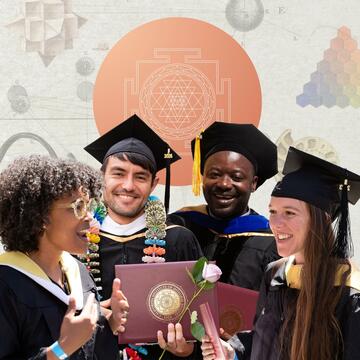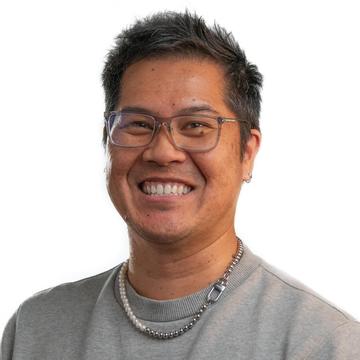A Free Online Overview with Jennifer Gruczelak, Nikole Moffett and Dennis Spears

M.A.-C.P. in Integral Counseling Psychology-Hybrid
Hybrid learning for aspiring clinicians — our three-year program nurtures healing and transformation in a diverse and complex world.
Program Overview
Join Us
The Integral Counseling Psychology-Hybrid program expands the vision and training of the on-campus program and makes it accessible to a greater diversity of students, to meet the rapidly evolving needs of mental health and education in the digital age.
Start your journey today. Classes begin January 2026.
Our Approach
The Integral Counseling Psychology-Hybrid program is rooted in our department’s holistic, spiritually-oriented, multicultural, and liberatory framework for psychotherapy with individuals, groups, couples, and families. Students in the hybrid program benefit from the creative, immersive, and interactive use of technology, responding to advancements in the field of psychotherapy. By blending immersive, in-person intensives with engaging virtual coursework, students gain the best of both worlds — the convenience of online learning with the depth of face-to-face connection and experiential training. This program is designed for those who seek to bring profound, transformative healing into the world — whether through traditional therapy, telehealth, or innovative community-based approaches.
Note: The hybrid program is a distinct cohort with its own application process, pedagogy, and licensing outcomes. Students in the on-campus programs cannot transfer to the hybrid program.

Clinical Skills
Developing strong clinical skills is the core of our curriculum. In the hybrid format, students develop, refine and hone these skills utilizing innovative technology. The remote structure offers flexibility and convenience, while simultaneously giving students the experiential framework, theoretical depth, and integration that are hallmarks of the Integral Counseling Psychology program.
In addition to coursework and in collaboration with our field placement office, students engage in a year-long practicum. Graduates of the program are able to conceptualize and apply theoretical frameworks and appropriate interventions with a variety of client populations; diagnose, assess and make practical treatment plans; and attend to the needs and goals of the client, including being able to identify client strengths, core values, sources of resilience, and internal and external resources.
With support from the university field placement office, students will secure practicum sites in their own regional location, including those who are out of state. The curriculum is designed to meet the educational requirements for the California Board of Behavioral Sciences (BBS) Professional Clinical Counselor license (LPCC), as well as those of Oregon, Washington, and Nevada.

Diversity Awareness
The Integral Counseling Psychology program is rooted in an inclusive, critically minded, multiculturally affirming view of the human. We explore the social self within a societal context, understanding the role of power, privilege, safety, and oppression in the formation of the self. Students are actively encouraged to examine their own positionality and explore and challenge assumptions and biases, all toward developing a genuinely holistic, culturally competent therapeutic mindset in tune with the ever-changing world.

Personal Growth
The pedagogy of the Integral Counseling Psychology program is rooted in the belief that true learning is transformational. While we explore theory, ideas, and systems with intellectual vigor and dedication, we simultaneously focus on facilitating students’ inner learning process, which opens, challenges, and offers a new, broader view of self and others. We achieve this through experiential activities that stimulate deeper insight; projects and assignments focused on integrating knowledge in personal and practical ways; and class and group discussions that foster greater awareness, compassion, and humility.
Career Paths
CIIS’ Integral Counseling Psychology-Hybrid students are trained to become Licensed Professional Clinical Counselors (LPCCs) who understand family and community systems, attachment theory, contemporary trauma theory, cultural/racial dynamics, and transpersonal concepts as a means of treating families, couples, and individuals from varying populations and demographics.
Our graduates practice in:
- Private Practice – Offering therapy to individuals, couples, and families.
- Community Mental Health Centers – Providing counseling to underserved populations.
- Hospitals and Healthcare Facilities – Working in psychiatric units, rehabilitation centers, and primary care settings.
- Schools and Universities – Supporting students through school-based counseling and college mental health services.
- Substance Abuse Treatment Centers – Helping clients recover from addiction.
- Correctional Facilities – Providing mental health services to incarcerated individuals.
- Employee Assistance Programs (EAPs) – Offering workplace counseling and support.
- Government Agencies and Military – Working with veterans, active-duty personnel, and their families.
- Nonprofit Organizations – Supporting specific populations, such as survivors of trauma or domestic violence.
Curriculum
Online - 3 years | Full time | 5 online weekends per semester (Fri-Sun)
Years 1 and 2: 6-day residential intensive in the first semester, 3-day intensive at the start of the second semester
Year 3: 3-day intensive at the start of the first semester; 3-day intensive at the end of the second semester
Practicum: The one year practicum requirement can be accomplished in person at one of our three Integral Counseling Centers or at an external clinic. Our field placement office assists in all external placements.
Personal Psychotherapy Requirement: During your course of study and when you are in practicum, you are required to complete 50 hours of personal psychotherapy with a licensed mental health professional, 20 hours before practicum begins, and 30 hours during practicum.
Curriculum Highlights
ICPH 5602 The Clinical Relationship (3 units) The relationship between therapist and client is one of the central concerns of contemporary theories of therapeutic change. This course explores the relationship between therapist and client from the perspectives of contemporary psychoanalysis, humanism, and self-psychology. It provides various perspectives on transference and countertransference, and how to work with these dynamics in the clinical setting.
ICPH 6603 Multicultural Counseling and the Family (3 units) This course provides an overview of multicultural counseling through exploration of ethnic, social, and cultural mores and values of representative social groups and special populations. The content will focus on developing oneself as a student, therapist, and educator, who understands the complexity of human diversity—ethnicity, race, religion, sexual orientation, gender, socioeconomic class, and color. We will look at the limitations of current psychological models in addressing the particularities of our clients’ diverse familial and cultural backgrounds. You will be asked to do mindfulness practices, inquiry, and dialogue to explore experiences and cultural backgrounds to help uncover your own beliefs, unconscious assumptions, projections, countertransference, fears, and biases. The instructor will help create a safe space and offer appropriate exercises and communication tools to encourage authentic exploration and dialogue of an emotionally-charged topic.
ICPH 6830 Trauma (3 units) This course studies trauma and is designed to explore the rapidly expanding field of psychological trauma within a variety of theoretical frameworks (e.g., liberatory, relational, cognitive, neurobiological, clinical, sociocultural). The course will explore many areas including the meaning and nature of trauma; sociopolitical histories and current theories in the field; various types of traumas; how trauma and violence affect individuals, communities, and systems; trauma assessment and clinical diagnostic considerations. This class will also introduce students to the neuroscience of trauma and the impact of trauma on the body, as well as vicarious traumatization, and self-care and community-care models for therapists to sustain themselves in the field and in trauma work.
-
Sample Course of Study (66 units)
Semester 1 | Spring
- Human Development and the Family (3 units, partially in person at intensive retreat)
- Therapeutic Communication (3 units, partially in person at intensive retreat)
- Psychodynamics (3 units)
- Professional Orientation (2 units, partially in person at intensive retreat)
- Integral Yoga in the 21st Century (1 unit)
Semester 2 | Fall- Clinical Relationship (3 units)
- Multicultural Counseling and the Family (3 units)
- Group Dynamics and Facilitation (3 units)
- Family Dynamics and Therapy (3 units)
Semester 3 | Spring- Gestalt Therapy (3 units)
- Psychopathology and Psychological Assessment: Soul Wounds (3 units)
- Research Methods (3 units)
- Trauma (3 units)
Semester 4 | Fall- Psychological Assessment and Psychometrics (3 units)
- Couples Counseling (2 units)
- Career Counseling Theory and Practice: Right Livelihood (3 units)
- Professional Ethics and Family Law: Right Action (3 units)
- Human Sexuality (1 units)
Semester 5 | Spring- Transpersonal Psychotherapy (3 units)
- Advanced Treatment of Addictions: Hungry Ghosts (1 unit)
- Group Supervision (2 units)
Semester 6 | Summer- Individual Supervision (2 units)
- Psychopharmacology (3 units)
Semester 7 | Fall- Integrative Seminar (3 units)
- Individual Supervision (2 units)
- Community Mental Health (2 units)
Entry Requirements
If you would like to learn more about this program, we’re here to help. Explore our program further with in-depth materials, discuss your personal and career goals at one of our open houses, or get in touch with our admissions counselors, who are ready to assist you in navigating the application process.
Required Application Materials
- Online Admissions Application: Begin the application process by submitting an online application and paying the non-refundable $68 application fee.
- Degree Requirement: An undergraduate degree (B.A., B.S., or the equivalent) from an accredited college or university.
- Academic Prerequisites: Two undergraduate psychology courses from an accredited college or university are recommended but not required. Completion of coursework in one of the following areas is strongly recommended: human development, psychopathology, theories of personality, and/or introduction to psychology.
- Minimum GPA: A GPA of 3.0 or higher in previous coursework is required. However, a GPA below 3.0 does not automatically disqualify an applicant. CIIS will consider a prospective student whose GPA is between 2.0 and 3.0. These individuals are required to submit a GPA Statement and are encouraged to contact our Admissions Team to discuss their options.
- Transcripts: Official transcripts from all accredited academic institutions attended where 7 or more credits have been earned. If transcripts are being mailed to CIIS, they must arrive in their official, sealed envelopes. Transcripts from institutions outside the US or Canada require a foreign credit evaluation through World Education Services (WES) or CIIS will also accept foreign credential evaluations that are in a comprehensive course-by-course format from the current members of the National Association of Credential Evaluation Services (NACES).
- Admissions Essay: A one-page (typed, double-spaced) statement that explores the following:
- What experiences have you had talking about identity differences, (like race, gender, ability, sexual orientation, religion, socioeconomic status etc.) social location, and power and privilege related to identity?
- What kinds of emotions do you notice yourself feeling in these kinds of conversations?
- How have you, or might you work with or regulate difficult emotions when they arise?
- Autobiographical Statement: A four-to-six page (typed, double-spaced) introspective autobiographical statement describing your personal values, emotional and spiritual insights, and meaningful life experiences that are foundational to your development and that led to your decision to apply. Please note that we will not accept autobiographical statements produced with AI, which will result in the automatic disqualification of your application. We want to hear your voice, in your words, articulating your journey.
- Goal Statement: A one-page (typed, double-spaced) statement of your professional goals and objectives that demonstrates your commitment to the field of integral counseling.
- Resume
- Two Letters of Recommendation: Letters of recommendation will be accepted from academic advisors, professors, professional supervisors, or someone able to attest to your ability to undertake the work required for your program. Recommenders should use standard business format and include full contact information-name, email, phone number, and mailing address in the body of the letter.
- Interview: Individual and group interviews by invitation from the admissions committee.
Candidate Selection
CIIS’ Integral Counseling Psychology program seeks individuals who:
- Have some background or interest in integral/East-West philosophy and psychology.
- Are pursuing a path of personal growth through yoga, meditation, personal psychotherapy, etc.
- Have demonstrated a capacity to learn and work both independently and collaboratively.
- Show a demonstrated commitment to the field, through volunteer or paid experience in a psychologically-oriented community service agency.
We encourage and embrace diversity in our program, and place a high value on having students from a variety of racial and cultural backgrounds; other representations of diversity (including age range) are also important to us. We look at each applicant holistically, and if you feel passionate about this field, we welcome your application.
Events and Info Sessions
An Online Event with Admissions Counselors
A Faculty-Led Info Session with Anna Benassi


FAQ
-
Integral counseling incorporates the entire person — mind, body, and spirit — in the understanding and treatment of mental health. Using an integral approach, therapists explore a person’s thoughts, emotions, behavior, and relational history, along with the context of their environments, communities, and the world as a whole. Integral counseling psychology alums practice using a wide variety of modern, evidence-based theories and approaches.
With the advent of telehealth, the demand for psychotherapy in the online space has grown exponentially, creating new opportunities and challenges for therapists. The hybrid program is particularly suited to prepare students to meet this evolving need by integrating the holistic and socially-conscious principles that are a hallmark of the Integral Counseling Psychology program into the online setting, ensuring that we offer a clinical developmental process that is suited to the times, yet remains rooted in transformational praxis.
-
Our program is both personally and academically rigorous. We expect our graduates to have both a deeper understanding of themselves and the theories and orientations we teach. At CIIS, the education is exemplary, evidenced by the fact that our alums have historically had the highest licensing exam pass rates of all California graduate degree programs. Students come away as leaders in their communities, offering a space of healing, wholeness, and integrity for those whose lives they touch.
Our hybrid program is designed to provide the same depth, quality, and transformative experience as our in-person programs while offering flexibility and accessibility suited to the modern world. This allows students to engage in rigorous academic and clinical training while balancing the personal and professional responsibilities of working professionals.
-
Despite being primarily online, our hybrid program fosters meaningful relationships with faculty and peers through a cohort model that is founded upon immersive in-person retreats (once per semester) and virtual courses that center active discussions, group work, mentorship, and dynamic class engagement. We maintain a creative, active pedagogy and high-touch faculty support, ensuring students feel grounded in community with peers and faculty alike.
-
Gestalt therapy, developed by Fritz Perls, Laura Perls, and Paul Goodman, in the 1940s, is an experiential and humanistic form of therapy that was originally designed as an alternative to conventional psychoanalysis. Gestalt therapists use creative and experiential techniques to enhance awareness, freedom, and self-direction. The word gestalt comes from the German word meaning shape or form, and it references the character or essence of something. (Source)
-
The professional practice of counseling is a regulated occupation in the state of California. Coursework in the M.A. in Counseling Psychology program at CIIS and each of its five programs is approved by the California Board of Behavioral Sciences (BBS) to fulfill educational requirements toward LPCC (Licensed Professional Clinical Counselor) licensing.
Students seeking licensure in California as an LPCC must register with the BBS after graduation and successfully complete additional post-graduate supervised clinical associate hours and written examinations. See the BBS’ Statutes and Regulations for additional information.
-
In many cases, our coursework and training is very similar or entirely portable to many states. However, each state has their own specific licensure requirements that include both academic coursework and clinical practicum hours that may differ from CA’s requirements.
In cases where this program does not meet the requirements for another state, additional coursework or practicum hours may be required. While licensure may be possible in another state, it is not guaranteed. Luckily, you will have the full support of the Director of the Master’s in Counseling Psychology who will help you understand the specific licensing requirements.
Lastly, you should consult the licensing boards of the appropriate state of country for the most up-to-date licensing information outside of California.

Take the Next Step
For over 50 years, CIIS has been at the forefront of education that integrates rigorous science, innovative scholarship, and social justice. You will learn from faculty at the forefront of their fields, local artists and activists, and a community of peers as passionate and dedicated as you. There’s never been a better time to be here – let’s build a healthier and more equitable world.




